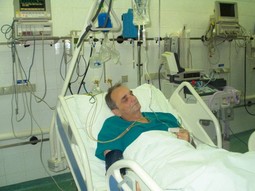Published in Nacional number 577, 2006-12-04
REPORT FROM THE OSIJEK HOSPITAL
Glavas euphoric, aggressive and disoriented
NACIONAL was the only media allowed to reach Branimir Glavaš in the Intensive Care Unit of Osijek Clinical Hospital to learn the details of his serious mental and physical condition caused by his prolonged hunger strike
 Branimir Glavaš on the Intensive care of Osijek hospital Despite the interruption of the investigation against him, the termination of his custody and transfer to the Osijek Hospital, Branimir Glavas’ medical condition is still very serious, as his digestive system continues to reject liquids, making Glavas vomit after even a glass of water. Since his transport from Zagreb to Osijek by ambulance on Saturday 2 December, Sunday and Monday were spent conducting tests to establish his precise condition and possible lasting physical damage: damage to the digestive tract, particularly ulceration, damage to the liver, kidneys and coronary system and possible damage to brain tissue.
Branimir Glavaš on the Intensive care of Osijek hospital Despite the interruption of the investigation against him, the termination of his custody and transfer to the Osijek Hospital, Branimir Glavas’ medical condition is still very serious, as his digestive system continues to reject liquids, making Glavas vomit after even a glass of water. Since his transport from Zagreb to Osijek by ambulance on Saturday 2 December, Sunday and Monday were spent conducting tests to establish his precise condition and possible lasting physical damage: damage to the digestive tract, particularly ulceration, damage to the liver, kidneys and coronary system and possible damage to brain tissue. In addition to physical problems, his 37-day hunger strike have left Glavas with mental scars as well – sudden mood swings from euphoria to depression, aggression and disorientation in time and space. As such, he had to receive several injections of sedatives on Saturday night and through Sunday.
Since being transferred from the prison hospital in Zagreb to the ICU Ward in Osijek, the Glavas case has taken on a new medical-political dimension: namely, his medical care is in the hands of his fiercest political opponents, beginning with hospital Chief of Staff Dr. Zeljko Vranjes, member of the HDZ city and county board. Those close to Glavas state that this fact is the main counter-argument to those who in recent days have tried to relativize Glavas’s health by saying that he is better than the Croatian public has been told. One of Glavas’s closest associations, MP Ivan Drmic commented for Nacional last weekend, saying “Were Glavas a faker, the first to make this claim public would be the HDZ doctors in the Osijek Hospital. Instead, they have put him into the ICU Ward, proving that Glavas’s medical condition is still very serious”.
The recovery and treatment of Branimir Glavas, and all further medical and judicial proceedings will be strongly influenced by politics, as proved by the events of recent days. Saturday’s decision by investigative judge Zdenko Posavec to interrupt the investigation and terminate the detention against Glavas was preceded by the formation of a medical council made up of medical experts outside the prison hospital: specialist in forensic medicine Dr. Josip Skavic, internist Dr. Vladimir Gasparovic and psychiatrist Dr. Vera Folnegovic Smalc. On Tuesday 28 November, Posavec appointed them as expert witnesses who were required to report every 48 hours on Glavas’s capacity to participate in the court proceedings, i.e. to personally attend the questioning of witnesses in the Zagreb County Court.
The Council gave its first expert opinion on the afternoon 30 November, when Dr. Gasparovic and Dr. Folnegovic-Smalc proclaimed Glavas competent to attend the court proceedings. That same evening, Glavas fell ill and began vomiting and had muscle cramps due to a lack of potassium and calcium. Warden of the prison hospital, Dr. Esta Susic announced that despite his wishes, she would not allow him to attend the court proceedings the following morning and received verbal agreement from the Council president Dr. Skavic. Already that evening, it was clear that a paradox had occurred: on the one hand, the Council members had given their written report that Glavas was capable of attending court, while on the other they gave the prison hospital warden their verbal agreement that he was not permitted to attend court due to the new circumstances that had transpired.
Due to these contradictions, that evening Glavas began to claim that the doctors had begun to diminish the serious nature of his medical conditions and, in the hours that followed, he broke off all contact with any doctor, announcing that he would stop drinking water, which in the previous days he had only taken 2 to 3 glasses a day. According to Nacional’s sources in medical circles, were he to stop taking water, Glavas would quickly fall into a coma: after a 35-day hunger strike, a person who stops drinking water would like fall into a coma or die without hours, at most a day or two, due to poisoning of the body, i.e. the inability to flush out toxins.
On Friday, 1 December, Glavas’ physical condition worsened, and an oxygen tank was brought to his room. He fell into a serious mental state. The Council members visited him that day and the assessment by psychiatrist Dr. Vera Folnegovic Smalc was critical in making the decision that Glavas was no longer capable of participating in the court proceedings. Investigative judge Zdenko Posavec received that official opinion the next day, at about 1:30 pm on Saturday, 2 December. Only half an hour later, he made his decision to interrupt the investigation and terminate his detention, informing Glavas’ attorney Ante Madunic first. At 2 pm, Glavas was no longer in detention and his attorney had to decide quickly as to which hospital to transport him to. Though they were suggested to choose between two Zagreb hospitals, Rebro and Dubrava, Glavas said he wanted to go to Osijek and the Administration of that hospital was contacted.
In the afternoon hours, preparations were underway for Glavas’ arrival, however, the doctors of the prison hospital warned that his condition was so severe that he would not be able to go in a personal vehicle as he could fall ill again at any moment. The decision was made to transport him in an ambulance, with a doctor by his side. At 6:15 pm, with the use of a cane and the help of the prison hospital staff, he began to descend from the second floor of the building in which he spent the last month. Ten minutes later, the ambulance was on its way to Osijek. Though Glavas was a free man from 2 pm, it is interesting that a police vehicle escorted the ambulance the entire way and, according to eye witnesses, police vehicles were parked at all exits from the freeway to Osijek.
The special treatment continued upon his arrival in Osijek. According to Nacional’s sources, Dr. Vranjes, hospital director Ante Madunic, Glavas lawyer, with Ljubo Cesic Rojs contacted Health Minister Neven Ljubicic by telephone and informed him that regardless of which ward Glavas would be admitted to, only members of his immediate family would have visiting rights. Just before 9 pm, the Osijek Hospital was teeming with security: in addition to the increased number of hospital guards, many uniformed and plainclothes officers were also in the hospital. At about 9:30 pm, when the ambulance arrived, anaesthesiologist Dr. Boris Kratofil was assigned with examining Glavas and determining which ward he would be admitted to. With the agreement of other colleagues present, Dr. Kratofil decided that Glavas should be admitted to the Anaesthesiology and Intensive Care Ward.
Ante Madunic, Glavas lawyer, with Ljubo Cesic Rojs contacted Health Minister Neven Ljubicic by telephone and informed him that regardless of which ward Glavas would be admitted to, only members of his immediate family would have visiting rights. Just before 9 pm, the Osijek Hospital was teeming with security: in addition to the increased number of hospital guards, many uniformed and plainclothes officers were also in the hospital. At about 9:30 pm, when the ambulance arrived, anaesthesiologist Dr. Boris Kratofil was assigned with examining Glavas and determining which ward he would be admitted to. With the agreement of other colleagues present, Dr. Kratofil decided that Glavas should be admitted to the Anaesthesiology and Intensive Care Ward.
With this, the rules laid down by hospital director came into effect: a security guard was posted at his door with a list of persons permitted to visit him. Also, Glavas himself is not permitted any contact with the outside world, as there is no telephone in the Intensive Care Ward and the use of mobile telephones is not allowed. The final decision by hospital director Vranjes is that from the moment of Glavas’ admittance, the public no longer has the right to information about Glavas’ condition, as he is no longer a prisoner and is now only an “ordinary” patient, thereby banning his physicians from informing anyone of his condition.
Glavas’ current medical condition, according to Nacional source’s from medical circles, is still very serious, as his body still refuses to accept fluids due to the imbalance of electrolytes and increased acidosis. Though Glavas was in a state of euphoria on Saturday afternoon, by the time of his arrival in Osijek in the evening he was already very tired and weak, as well as disoriented in time and space. He woke several times through the night, was aggressive and demanding he be released to go home and at one point in time he was still convinced that he was in the prison hospital in Zagreb, while a moment later he tried to explain to the hospital staff that he wanted to go to the Osijek stadium to watch a football game, though it was already night.
Considering that he is very weak and not very mobile due to the cramps in his muscles, the hospital staff have to help him to the washroom. Due to his unrest in the night, he received two injections with sedatives and in talking with the medical staff, he twice fell asleep in mid sentence. On Saturday, Dr. Vranjes appointed a three-member medical team that will care for Glavas in the coming days: head of the Internal Medicine Ward, Dr. Aleksandar Vcev, head of ICU Dr. Dubravka Ivic and head of the Psychiatric Ward Dr. Pavo Filakovic.
According to Nacional’s sources, the greatest problem is still the start of Glavas’ feeding, as several attempts have already failed. Glavas vomits everything he drinks, proving that his digestive system has been seriously damaged. For that reasons, doctors are expecting he will spend at least the next week in the ICU ward. He could spend up to three months recovering in hospital.
On Monday, 4 December, Glavas fell ill again, and doctors suspect that his kidneys have begun to fail. Glavas’ cardiovascular system is also at risk and due to complaints of double vision, it is possible that he has permanent lasting brain damage. As such, Dr. Vranjes added a neurologist to the medical team.
href="mailto:plamenko.cvitic@nacional.hr">
Related articles
Racan's Government Knew Of Scotch Tape Case
Nacional last week gained insight into documentation which indicates that leads pointing to the so-called Scotch tape case and the perpetrators of… Više
Latest news
-
28.10.2010. / 14:15
'A profitable INA is in everyone's interest'
-
28.10.2010. / 09:38
Sanader’s eight fear SDP — Won’t bring down Government
-
21.10.2010. / 15:02
Interior Ministry turned a blind eye on Pukanic assassination
-
20.10.2010. / 09:34
Barisic could bankrupt HDZ




